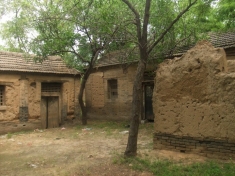30 Years of Advocacy for Rivers and Human Rights: A newcomer’s perspective
As the heavy doors of Boalt Hall Room 110 swung open, a wave of nostalgia hit me. Memories of sitting through late-night meetings with fellow student organizers, one of us frantically scribbling ideas for our next social-justice-related direct action on the whiteboard while the rest of us spoke over each other; presentations and talks that I went to and snagged a free meal from whenever I had the chance. I couldn’t believe it, but I realized I missed being an undergrad. I dragged my two bags filled with International Rivers publications onto a table in front and started laying them out as Peter, my colleague and Policy Director at International Rivers, set up his presentation and spoke with the students who were hosting the talk he was about to give, “30 Years of Advocacy for Rivers and Human Rights.”
This is my third month working at International Rivers’ Berkeley office. I graduated from UC Berkeley, or “Cal” as we students and alumni call it, almost two years ago – long enough to have gotten some perspective on “the real world” but not long enough to shake the detailed memories of campus life. Cal took me through stages of being optimistic about humanity and the world, horrified at the state of humanity and the world, disillusioned and jaded, resigned to the fact that things are the way they are, before ending with a crescendo of a resolution to just do what I can for the world. It made me not just aware of, but passionate about, the attempts to fight oppression and seek justice by communities affected by colonialism and capitalist development.
Working at International Rivers has been one way that I’ve attempted to “do what I can for the world.” Sitting in the crossroads between human rights and environmental protection – an environmental justice movement in its most fundamental sense – International Rivers excited me with its capability to house disparate communities, movements, and issues under one roof, providing a space for connections to be made. All of the staff, board, supporters, and partners who I’ve worked with have made the history of our 30 years of work tremendously significant to the world yet at the same time personal and human, and I couldn’t feel more grateful and privileged to be part of it.
On a daily basis, though, keeping the bird’s eye view of what we do isn’t always easy. It can be difficult to remember the connection between entering data into a spreadsheet in Berkeley and the talks currently in session about the Don Sahong Dam planned in the Mekong, for example, or the outreach being done with the tribes on the banks of Lake Turkana. Looking at numbers in boxes or black ink on white paper can make one feel removed from the work that’s being done “out there” on the rivers.
So, as I sat there in a crowd of law students watching Peter’s presentation, I found myself being drawn in all over again. Peter talked about the threats that megadams pose to Earth’s ecosystems and the communities that live along the dammed rivers. He described how in 2000, things seemed to be going well for us – the US stopped funding megadam projects due to human rights concerns that International Rivers and our partners had raised. However, in 2003, China Exim Bank funded its first dam project, the Merowe Dam in Sudan, giving rise to the now current trend of non-western banks funding overseas development infrastructure projects with little regard for the people who they marginalize and displace in the process. In the face of this new threat, International Rivers has fought many battles to stop the dams that would harm the world’s most important rivers. But is there more to winning than just stopping one dam project at a time? Perhaps we’ve been able to teach the institutions we challenge a lesson – that we will not be silent in the face of their destruction. And perhaps over time, we’ll get them to change the way they collectively think. In fact, several dam financiers and developers have already created, with International Rivers’ and a score of other collaborators’ input, stronger social and environmental standards. Now the challenge is enforcing those standards.

Students in the audience asked Peter about dams and climate change, how to change dam building policies, and what happens to populations who are displaced by dams. As they did, I thought about all of the threads that were tying themselves together for me in that room – the work I do from my desk, to the work of those still fighting for compensation for their flooded land and homes; my own family’s history of living through the development of rural China, to the disruption of place-based societies happening throughout the world; my experience of being a student of these trends, to now putting myself to work on them. Yet, once a student, always a student – and when it comes to rivers, the earth, and its people, I’m sure I’ll always have much more to learn.




